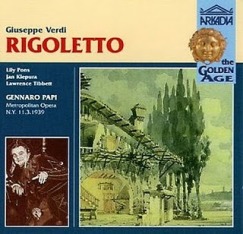Giuseppe Verdi – Rigoletto (Papi) [1939]
Giuseppe Verdi – Rigoletto (Papi) [1939]

1. Act I 2. Act II 3. Act III Duque de Mantua - Jan Kiepura Rigoletto - Lawrence Tibbett Gilda - Lily Pons Sparafucile - Virgilio Lazzari Maddalena - Helen Olheim Metropolitan Opera Chorus and Orchestra Gennaro Papi - conductor Live 11.3.1939
„Rigoletto” jest pierwszym dziełem Verdiego, które w pełni zasługuje na miano mistrzowskiego i ugruntowało jego sławę jako kompozytora poza granicami Włoch. Libretto, na kanwie dramatu Król się bawi Victora Hugo, opracował Francesco Maria Piave, zaś Verdi stworzył doń porywającą muzykę - bardzo efektowną, a przy tym pełną wyrazu i emocji. Czyni ona z bohaterów dramatu prawdziwych, żywych ludzi, którzy kochają, cierpią, zazdroszczą i się mszczą. „Rigoletto” porusza charakterystycznie zarysowanymi postaciami głównych bohaterów: libertyna Księcia, uwodzącego co dzień inną kobietę i jego zgorzkniałego, szyderczego błazna który, jak się okazuje, jest kochającym ojcem. Galerie postaci dopełniają płatny morderca Sparafucile, jego siostra Magdalena i zgraja snujących intrygi dworzan. Są to właściwie antybohaterowie, którzy tworzą odrażający świat. Kontrastuje z nimi córka Rigoletta - niewinna i słodka Gilda. Paradoksalnie, ją jedną, która potrafi kochać bezinteresownie i poświęcić się dla miłości, dotyka tragedia. Pomimo wstrząsającego tematu, dzieło pełne jest przepięknych fraz, to właśnie z Rigoletta pochodzi jeden z operowych szlagierów - aria Księcia z IV aktu "La donna e mobile".
Jan Wiktor Kiepura (1902, Sosnowiec, Poland –1966, Harrison, New York) was a Polish singer (tenor) and actor. He was born of a Jewish mother and a Polish father. His big début was on February 11th 1925 in the opera Faust (Gounod), also on the boards of the Wielki Theater in Warsaw. The audience that evening was in for a surprise, for the tenor to sing Faust, Dobosz, would not appear. Just before the opera started, the audience was informed that instead of Dobosz, Jan Kiepura would sing the role of Faust. The name Kiepura hardly rang a bell at that moment in time. In his biography of the tenor, Jerzy Waldorff describes the performance that evening of February the 11th. Waldorff recalls the sharp contrast between the initial disappointment of the audience due to the absence of Dobosz, and the growing enthusiasm during the performance, which started by stupefaction from the first notes Kiepura emitted, climaxing in a standing ovation at the end. In the following months Kiepura gained popularity singing in Rigoletto (Verdi), Halka (Moniuszko) and Cavalleria Rusticana (Mascagni) at the Warsawian Wielki Theater. In 1926 he left Poland. Before World War II, he built a well-known hotel, "Patria", in Krynica-Zdrój, which cost him about US$3 million. Some Polish movies were made there. He played in twelve musicals. Kiepura acquired great fame in the '30s, shifting the emphasis from opera to the big screen.
download: uploaded yandex 4shared mediafire solidfiles mega zalivalka filecloudio anonfiles oboom
Last Updated (Monday, 16 June 2014 21:26)
